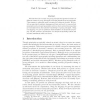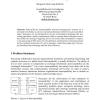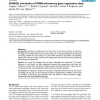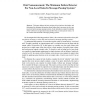1634 search results - page 154 / 327 » Reasoning about Knowledge Using Rough Sets |
91
Voted
FM
1999
Springer
15 years 5 months ago
1999
Springer
We introduce the concept of a group principal and present a number of different classes of group principals, including threshold-group-principals. These appear to naturally usefu...
107
Voted
GI
2007
Springer
15 years 7 months ago
2007
Springer
: State-of-the-art interoperability between heterogeneous systems on a technical level builds on services oriented architectures (SOA) for a given problem space. Semantics can be i...
BMCBI
2006
15 years 26 days ago
2006
Background: Simulation of DNA-microarray data serves at least three purposes: (i) optimizing the design of an intended DNA microarray experiment, (ii) comparing existing pre-proce...
127
click to vote
BMCBI
2004
15 years 20 days ago
2004
Background: Information obtained by DNA microarray technology gives a rough snapshot of the transcriptome state, i.e., the expression level of all the genes expressed in a cell po...
WDAG
2009
Springer
15 years 5 months ago
2009
Springer
This paper defines the basic notions of local and non-local tasks, and determines the minimum information about failures that is necessary to solve any non-local task in message-p...




